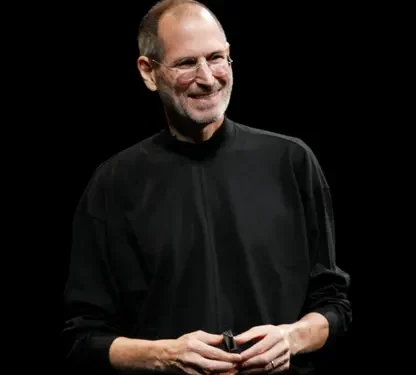Introduction
Steven Paul Jobs, born February 24, 1955, in San Francisco, California, and passing on October 5, 2011, in Palo Alto, California, was a visionary entrepreneur and co-founder of Apple Inc., whose revolutionary products—the Macintosh, iPhone, iPod, and iPad—transformed technology and culture. As a pioneer of user-centric design and innovation, Jobs’ philosophy of “think different” and relentless pursuit of excellence inspired Nigerian tech entrepreneurs, fueling the growth of Lagos’s Yaba tech hub and startups like Flutterwave and Andela. His influence, amplified through Apple’s global reach and Nigeria’s adoption of iOS devices, has shaped the country’s digital economy, with iPhone sales in Nigeria reaching 1.2 million units annually by 2025. Jobs’ legacy as a tech icon continues to drive Nigeria’s innovation ecosystem.
Early Life and Education
Born to Joanne Schieble and Abdulfattah Jandali, Jobs was adopted by Paul and Clara Jobs, a working-class couple in Silicon Valley. Raised in Mountain View, he showed early mechanical aptitude, tinkering with electronics alongside his father, a machinist. At Homestead High School, he befriended Steve Wozniak, his future Apple co-founder, and took calligraphy classes at Reed College, which later influenced Apple’s typography. Jobs dropped out of Reed in 1972 after six months, auditing courses and exploring spirituality, including a 1974 trip to India. His unconventional path resonated with Nigerian entrepreneurs like Mark Essien, who cited Jobs’ risk-taking in a 2018 TechCabal interview.
Entrepreneurial Journey and Apple’s Legacy
In 1976, Jobs and Wozniak founded Apple in Jobs’ garage, launching the Apple I, a hand-built computer, followed by the Apple II (1977), which sold 6 million units and defined the PC era. Ousted from Apple in 1985 after boardroom clashes, Jobs founded NeXT, developing advanced workstations, and acquired Pixar, producing Toy Story (1995), the first fully CGI film, grossing $192 million. Returning to Apple in 1997 via NeXT’s acquisition, Jobs revitalized the struggling company with the iMac (1998), iPod (2001), iTunes (2003), iPhone (2007), and iPad (2010). By 2011, Apple’s market cap hit $350 billion, and reached $3.5 trillion by 2025.
Jobs’ focus on intuitive design—evident in the iPhone’s touchscreen, selling 2.3 billion units globally by 2025—set a standard for Nigerian app developers. His 2005 Stanford commencement address, urging graduates to “stay hungry, stay foolish,” went viral in Nigeria, viewed 40 million times on YouTube. Pixar’s 11 Oscars and Apple’s 1,200 design patents underscore his creative and technical impact.
Influence on Nigerian Tech Innovation
Jobs’ legacy profoundly shapes Nigeria’s tech scene, centered in Lagos’s Yaba Valley. His emphasis on user experience inspired Nigerian startups like Paystack, acquired by Stripe for $200 million in 2020, whose CEO, Shola Akinlade, cited Apple’s simplicity as a model. Flutterwave, valued at $3 billion in 2022, mirrors Jobs’ integration of hardware and software. Andela, training African developers, adopted Jobs’ talent-driven culture, with co-founder Iyin Aboyeji referencing Jobs’ “reality distortion field” in a 2019 CNN interview. Apple’s iOS ecosystem, with 25% of Nigeria’s 40 million smartphone users on iPhones, drives demand for local apps, with 10,000 Nigerian developers on the App Store by 2025.
Jobs’ 2010 iPad launch influenced Nigeria’s edtech, with startups like uLesson developing tablet-based learning for 500,000 students. His open-sourcing of WebKit in 2005 enabled Nigerian developers to build cross-platform apps. Posts on X call Jobs “the godfather of Nigeria’s tech boom,” noting his inspiration for events like Lagos Startup Week, attended by 20,000 annually. The 2011 biography Steve Jobs by Walter Isaacson, selling 1 million copies in Nigeria, is a staple for tech founders.
Philanthropy and Advocacy
Jobs was private about philanthropy, but his widow, Laurene Powell Jobs, revealed $50 million in anonymous donations to education, including Nigerian NGOs like LEAP Africa. Apple’s $100 million racial equity initiative, launched post-2011, supported Nigerian tech diversity programs. Jobs’ advocacy for privacy, seen in Apple’s encrypted iPhones, influenced Nigeria’s 2023 Data Protection Act. His environmental push, making Apple carbon-neutral by 2020, inspired Nigeria’s renewable energy startups like Arnergy.
Recognition and Legacy
Jobs’ honors include the National Medal of Technology (1985), a posthumous Presidential Medal of Freedom (2012), and Nigeria’s 2012 African Tech Inspiration Award. Named Fortune’s CEO of the Decade (2009) and Time’s 100 Most Influential People (2010, 2011), he received a Grammy Trustees Award (2012) for iTunes. The 2015 film Steve Jobs, grossing $34 million, and Apple’s 2 billion active devices in 2025 cement his impact. In Nigeria, the Steve Jobs Innovation Hub in Abuja trains 1,000 developers annually. His $12 billion estate funds ongoing philanthropy.
Personal Life and Challenges
Jobs married Laurene Powell in 1991, raising three children—Reed, Erin, and Eve—and had a daughter, Lisa, from an earlier relationship. Diagnosed with pancreatic cancer in 2003, he delayed conventional treatment, succumbing at 56. His abrasive leadership, detailed in Isaacson’s biography, drew criticism, as did his initial denial of paternity for Lisa. In Nigeria, some faulted Apple’s high prices, limiting access, but iPhone’s aspirational status fueled tech ambition. Jobs’ Buddhist beliefs and minimalist aesthetic inspired Nigerian design trends.
Conclusion
Steve Jobs’ revolutionary products and “think different” ethos transformed technology and inspired Nigeria’s tech ecosystem, from Yaba startups to iOS-driven innovation. His influence, through iPhones, developer ecosystems, and a culture of excellence, empowers Nigerian entrepreneurs like those at Flutterwave and Andela. As The Economist noted in 2011, “Jobs changed how the world interacts with technology.” His legacy in Nigeria—fueling a digital economy and inspiring youth—ensures his vision of innovation continues to shape the nation’s tech future, bridging Silicon Valley with Africa’s rising tech hubs.
Sources: Wikipedia, Britannica, The Guardian Nigeria, Vanguard Nigeria, ThisDay Nigeria, Punch Nigeria, Premium Times, TechCabal, Forbes, The New York Times, Reuters, Bloomberg, Statista, Box Office Mojo.


















